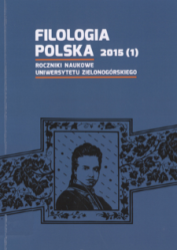The mother-daughter relationship in The Shrew [Jędza] by Eliza Orzeszkowa
Keywords
Abstract
A few historians of literature have written about The Shrew [Jędza] (1891) by Eliza Orzeszkowa. Apart from a few reviews, it is difficult to find studies or even references to the novel. Yet, this narrative does not only illustrate the end of the nineteenth century society – it is also a thorough study of the relation between the mother and a daughter. While recalling the figure of Antigone, I am interested in the analysis of the mother-daughter relationship, the aspect neglected not only by a few researchers of The Shrew [Jędza] (except the comments by Grażyna Borkowska in The Foreigners [Cudzoziemki]), but also by the interpreters of the myth of Oedipus. Furthermore, these problems are worth showing from a psychological perspective, especially because of the fact that the previous readings of the myth of Antigone and Oedipus, primarily used the anthropological and philosophical tools. The reference to the myth legitimizes the study by Borkowska entitled The Orzeszkowa and the Case of Antigone [Orzeszkowa i sprawa Antygony], in which the researcher has shown the links between Orzeszkowa’s novels and the various interpretive practices of the Sophocles’s dramas.
References
LITERATURA PODMIOTU
Orzeszkowa E., Jędza, Warszawa 1966.
[Google Scholar]
LITERATURA PRZEDMIOTU
Arcana J., Our Mothers’ Daughters, The Women’s Press, London 1979.
[Google Scholar]
Borkowska G., Cudzoziemki. Studia o polskiej prozie kobiecej, IBL PAN, Warszawa 1996.
[Google Scholar]
Borkowska G., Orzeszkowa i sprawa Antygony, [w:] Sekrety Orzeszkowej, red. G. Borkowska, M. Rudkowska, I. Wiśniewski, IBL PAN, Fundacja Akademia Humanistyczna, Warszawa 2012.
[Google Scholar]
Butler J., Żądanie Antygony. Rodzina między życiem i śmiercią, przeł. M. Borowski, M. Sugiera, Księgarnia Akademicka, Kraków 2010.
[Google Scholar]
Caplan P., Nie obwiniaj matki, przeł. D. Dowjat, Jacek Santorski & Co, INANNA, Warszawa 2006.
[Google Scholar]
Chodorow N., The Reproducing of Mothering. Psychoanalysis and the Sociology of Gender, University of California Press, Berkeley-Los Angeles-London 1978.
[Google Scholar]
Hegel F., Fenomenologia ducha, przeł. A. Landman, PWN, Warszawa 2010.
[Google Scholar]
Irigaray L., Ciało–w–ciało z matką, przeł. A. Araszkiewicz, Wydawnictwo eFKa, Kraków 2000.
[Google Scholar]
Irigaray L., Speculum, de l’autre femme, Minuit, Paris 1974.
[Google Scholar]
Jankowski J., Eliza Orzeszkowa, PIW, Warszawa 1966.
[Google Scholar]
Jaśkiewicz J., Kobiety-matki w wybranych tekstach publicystycznych Elizy Orzeszkowej, „Acta Universitatis Lodziensis. Folia Litteraria Polonica” 2010, t. 13.
[Google Scholar]
Kaschak E., Nowa psychologia kobiety. Podejście feministyczne, przeł. J. Węgrodzka, GWP, Gdańsk 2001.
[Google Scholar]
Kerényi K., Eleusis. Archetypowy obraz matki i córki, przeł. I. Kania, Homini, Kraków 2004.
[Google Scholar]
Orzeszkowa E., Kilka słów o kobietach, Księgarnia Gubrynowicza i Schmidta, Lwów 1873.
[Google Scholar]
Orzeszkowa E., O Polce Francuzom, [w:] eadem, List do kobiet niemieckich i o Polce – Francuzom, Księgarnia Bronisława Natansona, Warszawa 1900.
[Google Scholar]
Orzeszkowa E., Wspomnienia, [w:] eadem, O sobie, oprac. J. Krzyżanowski, Czytelnik, Warszawa 1974.
[Google Scholar]
Rich A., Zrodzone z kobiety. Macierzyństwo jako doświadczenie i instytucja, przeł. J. Mizielińska, Sic!, Warszawa 2000.
[Google Scholar]
Szlendak T., Socjologia rodziny. Ewolucja, historia, zróżnicowanie, PWN, Warszawa 2010.
[Google Scholar]
Żmigrodzka M., Orzeszkowa. Młodość pozytywizmu, PIW, Warszawa 1965.
[Google Scholar]
Preview
Downloads
Published
How to Cite
Issue
Section
Categories
Copyright & License

This work is licensed under a Creative Commons Attribution-NonCommercial-NoDerivatives 4.0 International License.
Copyrights (a). In principle, authors who are not employed by the University of Zielona Góra retain the copyright, including publishing rights to the articles, without restrictions.
Copyrights (b). In principle, authors who are employed by the University of Zielona Góra, do not retain the copyright, including publishing rights to the articles. In such cases the copyright holder is the University of Zielona Góra.
Print ISSN
2450-3584-
Abstract161











































